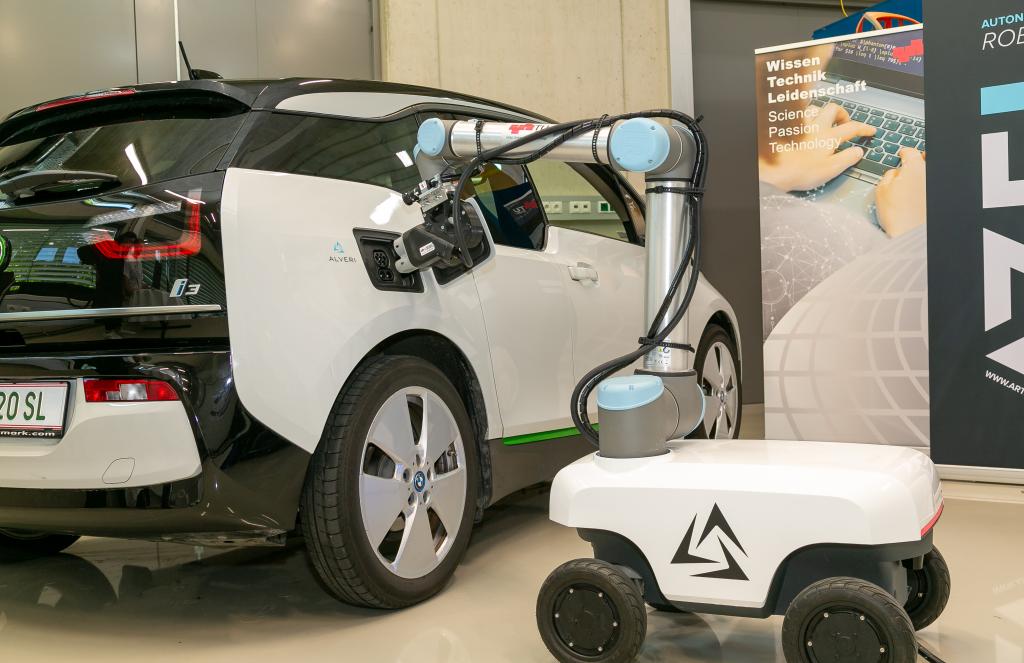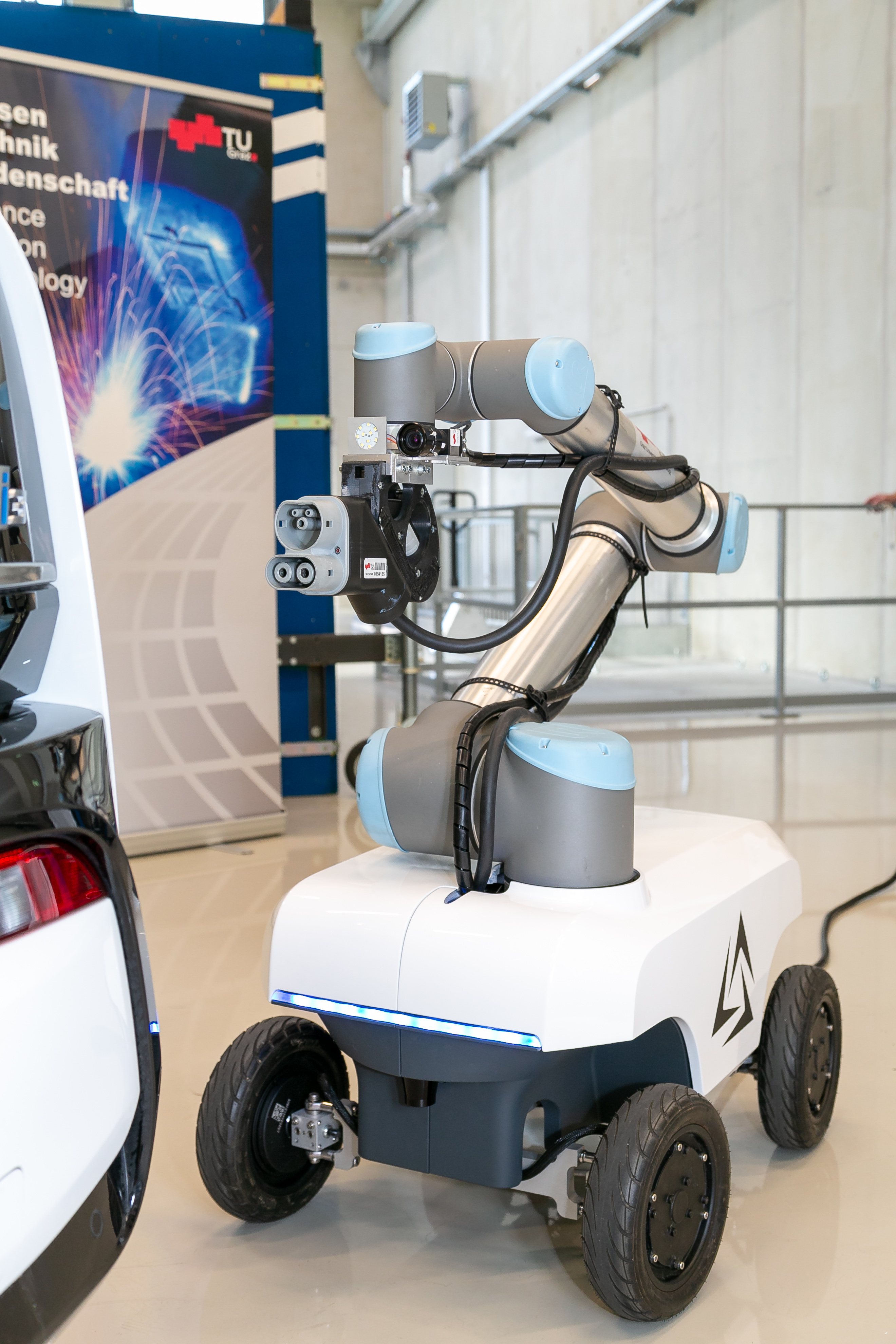Thessaloniki gets ready for its metro launch in November
The underground rapid transit lines have been under construction for almost two decades due to various project delays
 TheMayor.EU logo
TheMayor.EU logo 
The robot aims to make using electric cars easier , Source: © Frankl - Graz University of Technology
AlVERI CharBo is supposed to make electric mobility and drivers' lives easier
The Graz University of Technology (TU Graz) in Austria teamed up with the ARTI Robots start-up and the electric vehicle service ALVERI to develop “ALVERI - CharBo” – a robot capable of charging parked electric cars without human supervision.
The robot can move autonomously between the cars, recognize charging connections, and plug in. Electric vehicles are on the rise, and so is the demand for charging infrastructure. This creates a noticeable disparity, which this robot aims to fix.
Recently, the European Union has been pushing hard to fund an explosive transition into a more sustainable and green economy and infrastructure. This includes aggressive photovoltaic policies in Germany, a revitalisation of the rail network across the continent and even a veritable arms race between different countries to introduce hydrogen-powered vehicles.
Last week, Austria’s town of Krems an der Donau unveiled their first hydrogen-powered garbage truck, which cannot yet go into service because there are currently no hydrogen fueling stations in the region.
The case with electric vehicles is somewhat similar, but also different. This is due to the fact that the technology behind them is not that novel anymore and the idea of electric vehicles has been around for long enough to have some accompanying infrastructure present.
This helps for an easier transition - the presence of charging stations makes the purchase of an electric car seem more appealing because the infrastructure is already there.
At the same time, though, there are just around 8,000 charging stations in Austria and that is not enough.
Helmut Brunner from the Institute of Vehicle Technology in TU Graz explained that the robot is designed for service-specific charging areas in multi-story car parks which will make the implementation of the technology much more realistic.
 The automated robot arm guides the charging cable to the vehicle's
The automated robot arm guides the charging cable to the vehicle's
charging socket with millimetre precision,
Source: © Frankl - Graz University of Technology
At the moment, the charging lid of the vehicle needs to be kept open, so the robot recognises that it needs to be charged. In the future, the team plans to remove this inconvenience, by establishing some sort of communication between the vehicle and the robot, either through an app or something else.
Before the charging robot goes into mass production, however, there are still a few improvements to be made. It is currently still attached to the power cable, because the integration of a battery to power its movement has not made much sense up to this point, according to the team. It would only increase the machine’s weight and cost, from a monetary and ecological point of view. The team is working on a power supply through ground contacts.
The software controlling the robot also needs to be integrated as currently, it is running on a separate PC.
This is all intended to make the use of electric vehicles much easier, as Brunner stated in a press release: “The idea behind it is very clear - to increase the convenience of electric mobility even further. It intends to free the user, the driver, from any concern about his range and from worrying about the state of charge of the vehicle."
If you want to keep up with how European cities and regions are changing, follow us on Facebook, Twitter and Instagram.

The underground rapid transit lines have been under construction for almost two decades due to various project delays

Now you can get your wine in Talence by paying directly in Bitcoin

That’s because the state has to spend money on updating the railway infrastructure rather than subsidizing the cost of the popular pass

Rethinking renewable energy sources for the urban landscape

The examples, compiled by Beyond Fossil Fuels, can inform and inspire communities and entrepreneurs that still feel trepidation at the prospect of energy transition

Now you can get your wine in Talence by paying directly in Bitcoin

The 10th European Conference on Sustainable Cities and Towns (ESCT) sets the stage for stronger cooperation between the EU, national and local level to fast track Europe's transition to climate neutrality.

At least, that’s the promise made by the mayor of Paris, Anne Hidalgo

The underground rapid transit lines have been under construction for almost two decades due to various project delays

At least, that’s the promise made by the mayor of Paris, Anne Hidalgo

Hostal de Pinós is located in the geographical centre of the autonomous region

Despite its church-y name, the district has long been known as the hangout spot for the artsy crowds

Urban dwellers across the EU are having a say in making their surroundings friendlier to people and the environment.

Forests in the EU can help green the European construction industry and bolster a continent-wide push for architectural improvements.

Apply by 10 November and do your part for the transformation of European public spaces

An interview with the Mayor of a Polish city that seeks to reinvent itself

An interview with the newly elected ICLEI President and Mayor of Malmö

A conversation with the Mayor of Lisbon about the spirit and dimensions of innovation present in the Portuguese capital














